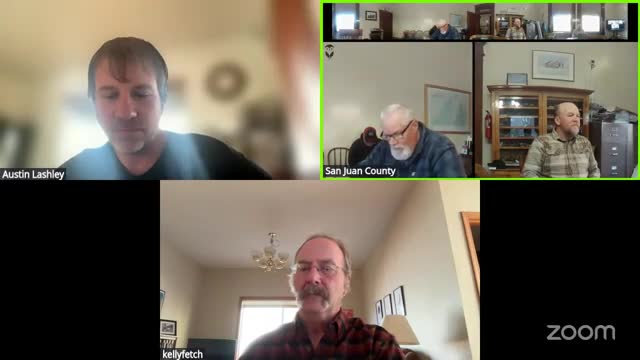Doctor proposes nonprofit administrator and FQHC pathway as Silverton clinic demand surges; asks county for $60,000 to fund first hire
Get AI-powered insights, summaries, and transcripts
Subscribe
Summary
Dr. David Brown told the San Juan County commissioners the Silverton clinic is operating above capacity and asked the county to fund a full‑time administrator/medical‑assistant salary of about $60,000 to stabilize operations and begin steps toward a patient‑centered medical home and, eventually, a federally qualified health center.
Doctor David Brown, who operates the recently expanded Silverton clinic, told the San Juan County Board of Commissioners that demand for primary care in Silverton has grown rapidly and the clinic needs a full‑time administrative/clinical hire to keep services running safely and to pursue higher‑level certification and funding.
Brown presented weekly visit data and said adult appointment volume has moved from roughly half capacity to sustained levels above capacity; he said one recent week reached "183% capacity," meaning the clinic added extra appointment slots. Brown proposed creating a nonprofit administrative entity — which he described as the Silverton Health System — to employ an administrator who would also perform medical‑assistant duties. He said the county would fund that position at approximately $60,000 a year while the for‑profit clinic (High Country Remote Care) would contract to deliver direct patient care and contribute 5% of collections to the nonprofit.
"Ithink we might come to the point where, we need an entity that operates administratively and supports a lot of the front office, the back office," Brown said, adding that the first hire would wear "lots of hats" including clinical blocks and administrative time.
Brown explained the hire was intended as a near‑term operational fix that would also enable a two‑stage quality‑and‑reimbursement strategy: first to qualify as a patient‑centered medical home (PCMH) within about 12–18 months to improve payer contracting under value‑based care; and second, if feasible, to pursue federally qualified health center (FQHC) status later for higher Medicaid/Medicare reimbursement and grant eligibility. He repeatedly framed the FQHC option as the long‑range, uncertain endpoint: "there's still a lot of questions to answer with. So there's no guarantee that that is the endpoint," he said.
Commissioners and staff asked where the $60,000 would come from. Brown said the county would contract with or grant the funds to the new nonprofit to pay salary and benefits; he also said the clinic would set aside 5% of clinic revenue as a contribution. Commissioners and staff discussed possible funding sources including emergency services sales tax, public health pass‑through grants, and future federal grants should the FQHC path succeed. Public health staff noted they had not previously received emergency services money and said any use of those funds would require legal and budget review.
Commissioner questions also covered operational details: Brown described pharmacy inventory tripling in two months, ongoing home visits, pending payer contracts (including VA), and rising administrative workload from billing and credentialing. County staff told commissioners they would research where emergency services, lodging tax, or public health pass‑through funds might be used and bring options back for discussion; no formal appropriation was made at the meeting.
Why this matters: Brown and commissioners framed the request as an urgent operational step to preserve timely access to primary care in Silverton, relieve pressure on EMS and emergency services, and prepare the clinic to compete for value‑based contracting and federal grants. If the county funds the position, Brown said the clinic could maintain or expand appointments without sacrificing follow‑up, medication access and billing accuracy.
What happens next: County staff agreed to review possible funding sources and report back; Brown said he would continue clinic operations regardless of immediate county support. No formal vote or appropriation occurred at the session.
